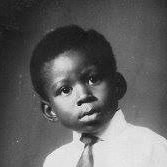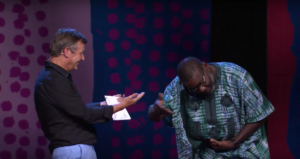The irony of this piece then and now does not escape me. Here we are inveighing on the psychological impact of British colonial rule in English. Then and even more so now, it clearer to me that two generations on, we really need to de-colonize our minds, way beyond the fiery rhetoric of the post-colonial polemicists that I adored as a young man. The simple question for me now is ‘can we modernize without necessarily westernizing?’ Enjoy.
True, we gained independence — political independence way back in nineteen-sixty — and also true, we declared ourselves, a wholly autonomous Republic three years later. But how true, or should I say, how far have we succeeded in remaining independent in thoughts, ideas and especially actions, since then?
This (to pre-empt some readers) is not one of those emotionally charged outbursts about negritude, black power, or neo-colonialism. True… it would revolve somewhat around these three as central themes. But it won’t be one of those blistering attacks on (the contemptible) institution of colonialism and neocolonialism made famous by Franz Fanon (in blessed memory). What I will be talking about is something more subliminal and subtler than the hard legacy of our colonial experience.
And it was triggered by newspaper reports that twenty-five members of the National Assembly (Committee on the Creation of States) chaired by Alhaji Abubakar Tuggar, were headed for craggy, inscrutable Switzerland to study how to create more states in Nigeria. What our honourable legislators (drivers, girlfriends, house-boys, cooks, house-girls, etc.) hope to discover in Switzerland about “state creation in Nigeria” is anybody’s guess.
I can understand, but not forgive them, wrangling a French holiday, in better times (everybody does it), but these are austere times. And they and their colleagues (who authorised the trip), I am sure, realise that the trip is otiose, ill affordable, and downright disgraceful. But what I am not sure they realise, is that by going on with the trip despite public demonstrations, their flagrant apathy to public opinion has further eroded the faith of the populace in the institutions of our democracy.
But in linking this trip with the central theme of this write-up, an “unfortunate” truth emerges.
It is most unfortunate that the majority of us Nigerians (especially the older ones) are still inebriated by our colonial experience. They (the older ones) stagger in a drunken daze, unsure of their newfound independence, and constantly look up to “massa” for guidance. They are afflicted with what I would call the “Yessa Massa” syndrome.
And they are the mould of the Western stereotype that casts Africans as incapable of wholly independent judgment, and indeed government, without constant help and supervision from the Western World. They, by undue adulation of Western ideals and values, propagate that unnatural master-servant relationship that typified the colonial era.
The ‘Oyinbos’ always knows best; that’s why we are going to Switzerland to learn about Nigeria.” Admittedly, the ‘Oyinbos’, because of our colonial experience, left us a legacy that is both good and bad. But isn’t it about time we sifted through both, to come up with the wholly good, and synthesise it with our own indigenous initiative, to form a third, new whole?
Isn’t it possible to apply a system of dialectics, to fashion out for ourselves a viable and relevant system of doing things?
We inherited the unitary Westminster system of government in the first republic but recently substituted it for the Federal American-style democracy. But we still have the cumbersome British-style civil service, and on this, we have superimposed an American-style bureaucracy.
The result: an enormous tangled web of red-tape that has little relevance to our lifestyles, and more importantly, our problems. And speaking of problems, I believe that one of the biggest hindrances in our march for a truly ‘independent’ identity, as a progressive nation is our mental attitude. It seems as if we have a predilection for Western diagnosis and treatment of our own problems.
For instance, the emphasis paid by the British colonialists on ‘good old British education’ for its colonies, has resulted in a Nigerian penchant for undue preference for paper qualification. It doesn’t matter if you can’t practically do the job; what matters is if you are supposedly qualified to do it. We are suffering from what somebody calls the ‘diploma disease’. So what we have are students that are learning to get a job, rather than learning to do it.
And so, when they fail to deliver, expatriates are then imported… to do a job which could have easily been done by suitably experienced Nigerians.
This colonial mentality seems to pervade all spheres of Nigeria; we haven’t forgotten, or maybe we can’t forget, that the colonial times of imperialist subjugation are over. Or maybe it’s because their – the colonialists – influence, was so total; even to the extent of influencing our genes?
For, how can you explain a situation where Nigerian youths, after spending a few weeks in England holidaying, come back with a rather heavy “English accent” and an aversion for everything Nigerian? If their progenitors are intoxicated by our colonial experience then, Nigerian youths (especially those of the middle and upper class) are stilling reeling from the hangover!
This sad fact portends further dependency on Western ideals, and our educational institutions still have a lot of ground to cover in altering their curricula to have direct relevance to the Nigerian situation.
But all said, we as Nigerians have all the resources at our disposal to transform this country into a glowing tribute to the black race. Undue dependency on the Western world, in both mind and matter, and in the extreme, obsequiousness, will only lead to subtler means of propagating neo-colonialism.
Think Nigerian … it’s our only hope.
STOP PRESS
I have just heard that the proposed jaunt to Switzerland has been stopped, at the instance of speaker Edwin Ume Ezeoke.
Good show!
The Punch,
Saturday, July 31, 1982



